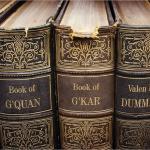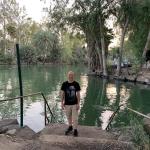For anyone interested in getting a glimpse of some of the exciting insights and groundbreaking new perspectives I’ve already come up with in the early stages of my research project focused on John the Baptist, I’m the keynote speaker at the Apostolic Johannite Church Conclave this weekend. My talk is titled “John the Baptist and the Mandaeans” and presents for a general audience some of what I consider the most interesting discoveries I’ve made thus far. Some are things implicit in our most familiar sources about John, yet which we’ve failed to see because we have not been as interested in John for his own sake as we ought to have been. Others involve connecting the dots between sources that are relatively unknown and neglected even by scholars. All of this will be presented in a form accessible to a general audience.
For those who may not already know, I’m writing a biography of John the Baptist for a general audience as well as an academic book with lots of detailed studies on specific matters related to John. I’m delighted to have this opportunity to share some of the answers I’ve come up with to questions like “Why did John, the son of priest, develop a baptism for the forgiveness of sins that competed with his father’s work in the temple?” and “What is the connection between John the Baptist and the origin of Gnosticism?” What better place to do so than the annual conference of a modern Gnostic church that emphasizes the spiritual legacy of John the Baptist?
Interested in attending? Visit the Apostolic Johannite Church’s website for details on how to register for this online event as well as details about the program, speakers, and more.
Many of you are already familiar with the Johannite Church through their TalkGnosis YouTube series which has interviewed scholars such as myself (many times) as well as just recently two leading scholars of “Gnosticism” (or whatever else one might prefer to call it), David Brakke and M. David Litwa. Take a look:
For those who know that I’ve been traveling recently, spending a week and a half in Israel and Palestine focused on places connected (in history and/or legend) with John the Baptist, I will soon share photos from the trip together with commentary. For now, I’ve been focusing on recovering from jet lag and getting ready for Conclave! Also of related interest, the provisional program for the American Academy of Religion Annual Meeting in November is now online. I’m in there twice, including in a session of the Traditions of Eastern Late Antiquity program unit in which I am presenting on a topic related to my keynote address this Saturday. Here is the abstract:
Late Antique Texts and Earlier History: The Case of John the Baptist and Mandaean Sources
There is a noticeable inconsistency when it comes to the use of sources from Late Antiquity as evidence for people and events in earlier times. In the case of Rabbinic sources, while there has been a shift away from the earlier tendency to assume they accurately depict the views of rabbis who lived centuries earlier, the consensus remains that there is material of historical value to be found in the Talmudim and related sources. In the case of Christian sources, on the other hand, most historians regard sources from our period (whether the Nag Hammadi texts or Syriac hagiography) as of little independent historical value in relation to the period of Christian origins. The main exception is the Gospel of Thomas. Precisely because it overlaps so extensively with the Synoptic Gospels in the New Testament, its connection with the historical Jesus (whether direct or indirect) is confirmed, and yet for the same reason its independent usefulness can be dismissed. If we lacked most of our earliest sources available to us, however, a source like Thomas might be simultaneously more precious to historians, and more difficult to confirm as historically valuable.
This conundrum provides an illustration of the situation with respect to the Mandaeans and John the Baptist. Using the relationship between late antique Jewish and Christian sources and first century history as a guide, I will make the case Mandaean literature can be useful to historians when studied in an appropriately critical fashion. This comparative study of how historical scholars treat Jewish, Christian, and Mandaean texts and traditions will further provide a basis for elaborating methodological principles that may (and, I will argue, should) equally be applied to all of them.













